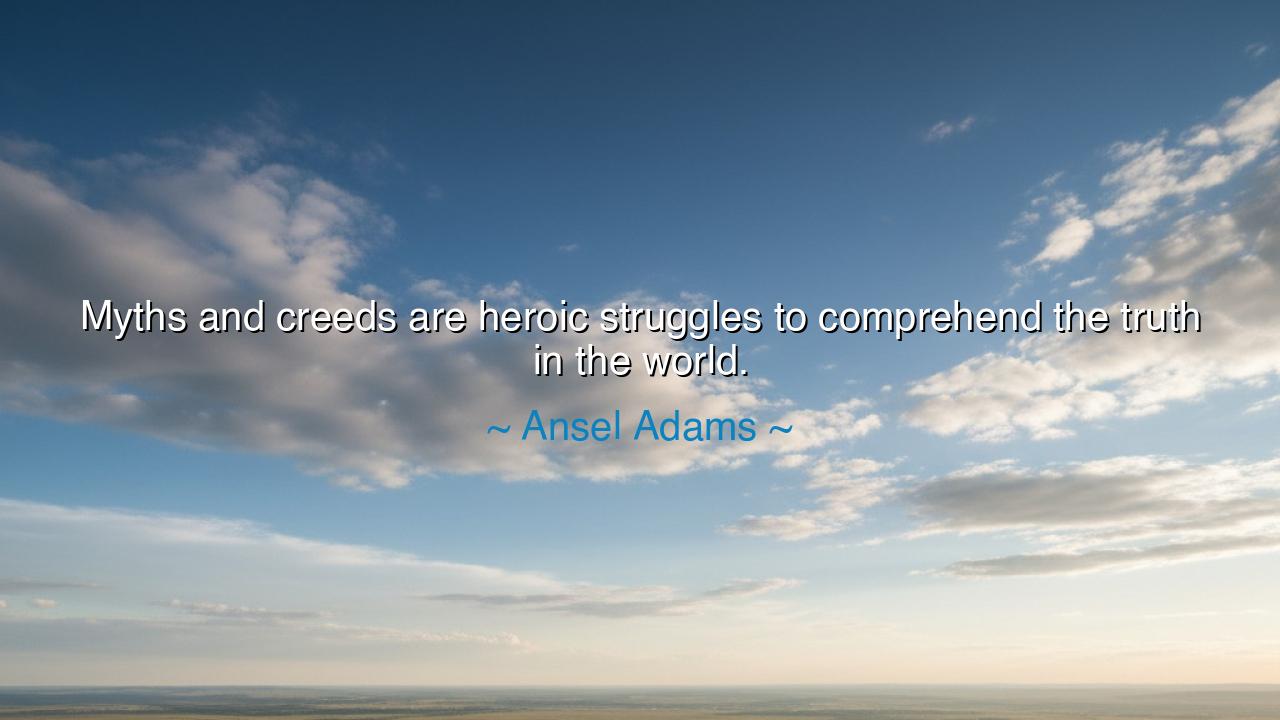
Myths and creeds are heroic struggles to comprehend the truth in






Hear the luminous words of Ansel Adams, a man who captured eternity through the lens of a camera: “Myths and creeds are heroic struggles to comprehend the truth in the world.” In this saying, he reminds us that the stories of old and the faiths of men are not empty fabrications, but profound attempts of the human spirit to grasp the infinite. Myths and creeds arise when the soul, overwhelmed by the mystery of existence, reaches upward in courage and downward in depth, seeking to give shape to what cannot be fully contained. They are the record of humanity’s heroic struggle to wrestle with the vastness of truth.
The ancients understood this intimately. When the Greeks spoke of Zeus hurling lightning from Olympus, or of Prometheus stealing fire, they were not merely telling fables. They were striving to express the mysterious powers of nature and the restless daring of man. When the Egyptians sang of Ra, or the Hindus of Brahma, they were reaching for explanations of creation, light, and order. These myths were poetry woven around realities too large to capture with fact alone. Adams, a craftsman of vision, knew that such stories were humanity’s first great attempt to frame the truth that surged all around them.
Consider the creed of early Christianity, born in the shadow of persecution. Those first believers, hunted and despised, forged statements of faith—words that distilled their deepest convictions. These creeds were not simply intellectual exercises; they were banners raised in the battlefield of ideas and blood. In declaring them, men and women risked their lives, proving that their attempt to comprehend truth was also an act of courage. They were, as Adams describes, a heroic struggle, one that shaped history.
History also offers the great epics—Homer’s Iliad, Virgil’s Aeneid, the Mahabharata of India. These are not mere entertainments, but sacred vessels of truth, carrying lessons of honor, sacrifice, betrayal, and destiny. Achilles’ rage, Aeneas’s duty, Arjuna’s hesitation on the field of battle—these are mirrors of the eternal struggles of mankind. In their battles and sorrows, we glimpse truths of mortality, purpose, and the divine. Each tale is humanity striving, often in darkness, to grasp a fragment of the eternal light.
Why do myths and creeds endure? Because truth is not simple. It is layered, infinite, and resists being bound in mere logic. The soul cannot live on facts alone; it hungers for meaning, for story, for vision. Thus, men craft myths not because they are ignorant, but because they are seekers. They shape creeds not to bind the world in chains, but to steady themselves in the storm. These are the maps we draw when navigating the oceans of mystery.
The lesson for us is this: honor the myths and creeds of the past, not as childish illusions, but as noble attempts to grapple with realities too immense to fully know. Read them with reverence, not disdain. See in them the reflection of your own struggle, for you too are seeking truth, and your own life will become a kind of creed, your choices a kind of myth. And while some stories may fade or change, the longing behind them is eternal—the longing for meaning in a vast and wondrous world.
Therefore, let this wisdom be carved into your heart: myths and creeds are not chains but torches. They are humanity’s heroic attempts to light the dark corridors of existence with flames of imagination and faith. Do not mock them; learn from them. Do not dismiss them; continue their work. For you, too, are part of this great struggle, seeking the truth that sings in the wind, burns in the stars, and whispers in the depths of the soul.






HYHai Yen
Ansel Adams highlights the role of myths and creeds in helping humanity wrestle with truth. It makes me think about how these belief systems can be both unifying and divisive, depending on how they are interpreted. Could the heroic struggle to comprehend truth sometimes lead to conflict, as different myths or creeds clash? Or is this conflict a necessary part of our collective journey toward understanding deeper truths?
BTHUYNH BA TRIEU
This quote really resonates with the idea that the stories we tell—whether through myths, religions, or philosophies—are a reflection of our ongoing quest to understand the world. But how do we know if we’re on the right path in our search for truth? Are all belief systems equally valid in their attempts, or do some have more power to reveal universal truths than others?
QDNgo xuan quoc dat
I find this perspective on myths and creeds really powerful. It suggests that they are not just cultural artifacts, but active attempts to make sense of life. But I wonder, are these 'heroic struggles' always helpful, or do they sometimes lead to misconceptions or even harm? How do we discern when a belief system is truly helping us understand truth, versus when it might be limiting or distorting our view of the world?
KLTRAN KHANH LONG
Ansel Adams’ quote suggests that myths and creeds are born out of a desire to understand the deeper truths of life. It’s interesting to consider how, over time, these beliefs evolve as our understanding of the world changes. But if myths are our way of grappling with truth, does this mean that truth itself is ever-changing? Or are these myths merely stepping stones toward a greater, more universal truth?
MKle minh khang
This quote makes me think about how myths and creeds have always served as a way for humans to make sense of the world. They’re not just stories or beliefs; they represent our attempts to understand the truth of our existence. But how do we know when a myth has served its purpose, or when it’s time to move beyond it in search of more concrete answers? Can myths still hold truth in the modern world?